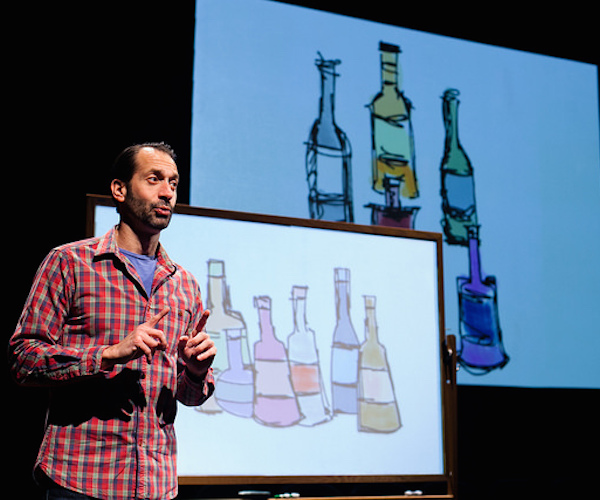Theater Review: “The White Chip” — An Ambitious Primer on the Woes of Alcohol
In his his comedy The White Chip, Sean Daniels displays a writer’s chops and a fearless desire to share his own pitched battle with alcoholism, a disease that nearly destroyed his career and his life.
The White Chip by Sean Daniels. Directed by Sheryl Kaller. Staged by the Merrimack Repertory Theatre at the Nancy L. Donahue Theatre, 50 East Merrimack Street, Lowell, MA, through January 31.

Jeffrey Binder in the MRT’s world premiere production of “The White Chip.” Photo: Meghan Moore.
By Glenn Rifkin
Taking on the subject of alcoholism in a stage play deposits a playwright into some heady company. Eugene O’Neill, Tennessee Williams, Thornton Wilder, and Edward Albee are just a few of the giants who crafted powerful dramas around excessive drinking and its ruinous influence on their characters’ lives.
But for playwright Sean Daniels, the artistic director of the Merrimack Repertory Theater in Lowell, the temptation to tackle this genre was personal and, for someone whose life is inextricably tied to the theater, inevitable. In his new comedy, The White Chip, making its world debut at the MRT, Daniels displays a writer’s chops and a fearless desire to share his own pitched battle with alcoholism, a disease that nearly destroyed his career and his life. Using humor as the vehicle for a decidedly unfunny subject is certainly one way to approach what can easily become a theatrical morass. And Daniels, along with director Sheryl Kaller, almost pull it off.
Unfortunately, the effort falls short of poignancy and feels, for much of the evening, like an ambitious primer on the woes of alcohol. Daniel’s autobiographical journey unfolds over the course of 90 minutes: there are white boards and teachable moments; a steady series of constructive Pros and Cons are offered up throughout. There are also plenty of laughs to be found among the moments of angst and horror and the three-person cast does its best to deliver the goods.
Jeffrey Binder, as Sean, speaks directly to the audience, an affable guide through his crushing descent into the darkness. Binder is earnest and displays impressive comedic timing and dramatic dexterity. When his frenetic rationalizations inevitably lead him into the darkest corners, costing him a dream job and his marriage, his rubbery face contorts with the horror and realization of self-destruction. His arms akimbo, he beseeches the audience, “How did it get to this?” Those few moments are indeed compelling and even transcendent. But they can’t overcome the overall impression that this is an acting troupe visiting a high school to deliver a creative but didactic lecture on the evils of drink.
Daniels leaves nothing to chance. He offers up his Mormon childhood and shares every nefarious milestone, from his first sip of beer to his years in denial while in a revolving door in and out of rehab. His deepest shame, abandoning his ailing father and not seeing him before he died, haunts him. This is potent stuff, and the fact that you find yourself laughing seconds after the play’s most traumatic scenes is certainly a tribute to Daniels’ comedic styling.
With Benjamin Evett and Isabel Keating taking on a variety of supporting roles, the small ensemble is dependent on the opportunities presented by the storytelling, particularly the various devices Daniels employs to deliver his message. Some of the latter work, some, like the regular listings of Pros and Cons, eventually become tedious and ineffective. At the end, the cast even offers “Sean’s Tips for Not Drinking.” Evett and Keating have a formidable task, switching characters so quickly that the audience is left wondering at times just who they are supposed to be. Is Keating now Sean’s wife or girlfriend or yet another character we may not recognize? This kind of ‘speed’ acting leaves little room for character development, though Evett is especially effective as Sean’s militaristic, evangelistic mentor in rehab.
Clearly, the play reflects Daniels’ commitment to sharing his story and changing lives. And to that end, it is an evening well spent. In the playbill, the dramatist writes about his quest to find a play about the search for sobriety when he was fighting his own battles. He found none.
“After I got sober, a thousand people came forward and said, “Oh, that’s great news, I’ve been sober for 20 years,” and while I was happy for them (and me), all I could think of was, `Where were you when I needed to know I wasn’t alone?’” he writes. “So now that I’m on the other side, I feel the need to write the thing I couldn’t find and be the person I wish I had found.”
The White Chip isn’t great theater, but sometimes the message is important enough to deserve an audience.
Glenn Rifkin is a veteran journalist and author who has covered business for many publications including The New York Times for more than 25 years. Among his books are Radical Marketing and The Ultimate Entrepreneur. His efforts as an arts critic and food writer represent a new and exciting direction.

